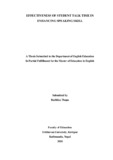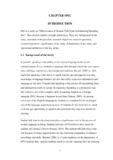Please use this identifier to cite or link to this item:
https://elibrary.tucl.edu.np/handle/123456789/1727| Title: | Effectiveness of Student Talk Time in Enhancing Speaking Skill |
| Authors: | Thapa, Radhika |
| Keywords: | Language;Student;Skill |
| Issue Date: | 2018 |
| Publisher: | Central Department of Education English |
| Abstract: | The present study Effectiveness of Student Talk Time in Enhancing Speaking Skill aimed at finding out the effectiveness of student talk time in developing students' speaking skill. This was an experimental research. I selected 30 students of grade VII of Manasalu Public School, Kathmandu District. The Selected students were divided into two groups, i.e. control and experimental group on the basis of odd even roll number. Pre-test and post-test were administered to collect data. Pre-test including five oral test items was administered for both groups to find out their initial speaking ability. The experimental group got special treatment whereas control group was taught using traditional lecture method. Each group taught for twenty eight days. Finally, post-test was administered for both groups using the same set of test items of pre test. Each student's speaking ability was recorded and analyzed. Pre-test and post-test results proved that the students under experimental group performed better than the students under control group. It means, increasing student talk time in the class room plays crucial role in developing speaking skill. This thesis consists of five chapters. The first chapter deals with the introduction of the topic. It consists of background of the study, statement of the problem, objectives of the study, research questions, significance of the study, delimitations of the study and operational definition of the key terms. The second chapter deals with the review of related theoretical literature, review of related empirical literature, implications of the review of the study and conceptual framework. Similarly, chapter three consists of the design of the study, population, sample and sampling strategy, source of data, data collection tools, data collection procedure, data analysis and interpretation procedure and ethical considerations. Chapter four consists of the analysis of data and interpretation of the results under different sub headings. Chapter five comprises findings, conclusion and recommendations. This chapter is followed by references and appendices used for the study. |
| URI: | http://elibrary.tucl.edu.np/handle/123456789/1727 |
| Appears in Collections: | English Language Education |
Files in This Item:
| File | Description | Size | Format | |
|---|---|---|---|---|
| Cover.pdf | 313.62 kB | Adobe PDF |  View/Open | |
| CHAPTER.pdf | 1.2 MB | Adobe PDF |  View/Open |
Items in DSpace are protected by copyright, with all rights reserved, unless otherwise indicated.
